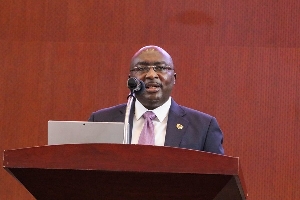Opinions of Tuesday, 26 September 2006
Columnist: Obosu-Mensah, Kwaku
Geeman Should be Pardoned
The Supreme Court on June 14, 2006 dismissed an appeal filed by Nana Agyeman also known as Geeman, a musician who was sentenced to life imprisonment for shooting to death Kwasi Agyei, a taxi driver some 11 years ago.
In a unanimous decision, the Supreme Court affirmed the decision of the Court of Appeal, which had earlier declared that evidence adduced against Geeman during an earlier trial, was overwhelming. Reading out the Court's decision, Mr. Justice Ansah noted that the appellant had mentioned that he was aggravated by the action of the deceased, who had threatened him by collecting sand under his footprints. Additionally, Mr. Ansah said Geeman in his evidence in chief had mentioned that the deceased had informed him that his mother hailed from Larteh where the supposedly powerful Akonodi fetish shrine is. Part of the reasons given by the Court for dismissing Geeman’s appeal read; "in matters relating to superstition, our criminal code does not consider that".
The case: On January 9, 1995, Nana Agyeman who was in the company of Abeiku Nyame and two other ladies, shot Mr. Agyei over additional fare of 2,000 cedis the taxi driver was demanding. Mr. Agyei, at about 0800 hours on that day, picked two guests from Odorkor to Geeman's residence at Dome CFC Flats and demanded 4,000 cedis as the transport fare. Geeman complained that the fare was too high and the two – Geeman and Mr. Agyei - exchanged harsh words. During the quarrel, Mr. Agyei warned Geeman that his (driver’s) mother hailed from Larteh where the supposedly powerful Akonodi shrine is. That meant, he intended to juju Geeman. In that angry mood, Mr. Agyei drove off.
However, he (Mr. Agyei) returned to the premises of Geeman to collect sand from Geeman's footprint, drew a line and threatened that whoever crossed the line would die. It was at this point that Geeman asked Mr. Agyei to reverse the said curse, and when he refused Geeman shot at him.
Of special interest as far as Geeman’s case is concerned is the recent incident at La Police Station on September 15, 2006. It was reported in the media that on that fateful day, three Fetish Priestesses had gone to the police station and cast a curse on the police. What is more interesting is that the Police at La went around looking for the Fetish Priestesses to revoke the curse. And what is most interesting is the fact that the police officers at La believe in the powers of juju. Hence, the police officers were relieved when the Fetish Priestesses returned on September 20, 2006 to revoke the curse
Also on September 20, 2006 it was reported that at a 3-day workshop for political parties and the media sponsored by the Institute of Economic Affairs (IEA) in Swedru, the national chairman of the National Democratic Congress (NDC), Dr. Kwabena Adjei, noted that spiritualism (juju) was creeping into Ghanaian politics. He added that spiritualism (juju) was causing the non-performance of the country’s political machinery. According to media reports, some participants supported him by shouting “in football too” suggesting that juju is employed in soccer also.
It is not only the police at La, or Dr. Kwabena Adjei or the participants at the seminar who believe in juju. In fact, many Ghanaians do believe in the supernatural powers of juju (I do not). Now, if Geeman really believe in juju like many others and was convinced that the taxi driver would use juju to kill or harm him then we have to forgive him for his ignorance. After serving 11 years in prison, it is time to grant him conditional pardon. I have two suggestions: one, he should be released to serve two years of community service by going to schools to preach non-violent resolution of problems to school children; two, the family of the deceased should be encouraged to bring a civil suit against Geeman so that he may eventually pay financial compensate to the family.













